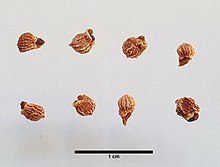Arisarum vulgare
| Arisarum vulgare | |
|---|---|

| |
| Inflorescences of Arisarum vulgare | |
| Scientific classification | |
| Kingdom: | Plantae |
| Clade: | Tracheophytes |
| Clade: | Angiosperms |
| Clade: | Monocots |
| Order: | Alismatales |
| Family: | Araceae |
| Genus: | Arisarum |
| Species: | A. vulgare
|
| Binomial name | |
| Arisarum vulgare | |

| |
| Rough native distribution of Arisarum vulgare | |
Arisarum vulgare, common name the friar's cowl or larus, is an herbaceous, perennial, rhizomatous plant in the genus Arisarum belonging to the family Araceae.
Description
[edit]
Arisarum vulgare reaches on average 10–30 centimetres (3.9–11.8 in) of height. The leaves of this geophyte plant are basal only, wide, ovate to arrow-shaped, with a petiole 12–15 centimetres (4.7–5.9 in) long. The stems are erect and unbranched, usually mottled and grow directly from the underground rhizome. A single leaflike bract (spathe) forms a purplish-brown or olive green striped tube about 5 inches long, with an open upper part helmet or hood-shaped curved forward. It encloses a fleshy greenish clublike spike (spadix) bent forward, protruding from the tube and bearing at the bottom minute purple violet flowers. The 20 male flowers are located above the four to six female, with sterile flowers completely missing. The flowering period extends from October through May. The sexes are united in the same individual plant. Pollination is granted by insects (entomophily). The fruits are greenish berries of about 1 centimetre (0.39 in)long.

Distribution
[edit]Arisarum vulgare is native to the Mediterranean Basin, from the Caucasus in the east to the southeastern Iberian Peninsula in the west, where it introgresses with Arisarum simorrhinum.[1][2]
Habitat
[edit]Arisarum vulgare prefers grassy fields and rocky scrubland, forests and wasteland, mainly in shady and cool places and in moist soils, at an altitude of 0–800 metres (0–2,625 ft) above sea level.
Subspecies
[edit]The main described subspecies are the following:
- Arisarum vulgare O.Targ.Tozz. subsp. vulgare (above described)
- Arisarum vulgare O.Targ.Tozz. subsp. simorrhinum (Durieu) Maire & Weiller
In Arisarum vulgare subsp. simorrhinum the flower stem is much shorter than the petioles. Bract and spadix are erect. The latter is thickened at the tip.
Gallery
[edit]-
Botanical drawing of Arisarum vulgare, Curtis's Botanical Magazine (1873)
-
Plants of Arisarum vulgare
-
Plants of Arisarum vulgare
-
Close-up on Arisarum vulgare
-
Leaf of Arisarum vulgare
-
Young Arisarum vulgare
Synonyms
[edit]
|
|
References
[edit]- ^ "Arisarum vulgare" (PDF). Flora Iberica. Retrieved 2 May 2021.
- ^ Kew World Checklist of Selected Plant Families
- ^ Synonyms in EOL[permanent dead link]
- Herbaro virtual
- Pignatti S. - Flora d'Italia - Edagricole – 1982 - Vol. II, pag. 629
- Tutin, T.G. et al. - Flora Europaea, second edition - 1993






